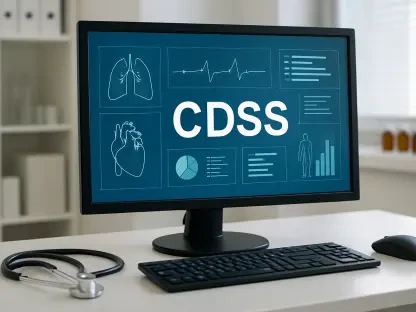The healthcare sector is under immense pressure, grappling with escalating patient expectations, overwhelming administrative tasks, and a critical need for precision in care delivery that often seems unattainable amidst shrinking resources. As providers struggle to balance quality care with operational demands, artificial intelligence (AI) agents emerge as a transformative force, offering a glimpse into a future where efficiency and personalization coexist seamlessly. These advanced digital assistants, far beyond the capabilities of traditional automation, are designed to learn, reason, and collaborate with humans, addressing systemic challenges head-on. Their potential to streamline workflows, enhance patient outcomes, and reduce costs positions them as indispensable allies in a rapidly evolving industry. This exploration delves into how AI agents can redefine healthcare by tackling pressing issues, showcasing their practical applications, and navigating the balance between innovation and ethical considerations, ultimately paving the way for a smarter, more connected system.
Addressing the Core Struggles of Modern Healthcare
The healthcare landscape is increasingly strained by a surge in patient volumes, fragmented data infrastructures, and a growing administrative burden that diverts clinicians from their primary focus on patient care. Patients now expect swift, tailored services, often placing unrealistic demands on systems already stretched thin by limited staff and resources. This creates a vicious cycle of burnout and inefficiency, where errors creep in and quality suffers. AI agents offer a lifeline by introducing intelligent automation that can handle repetitive tasks, integrate disparate data sources, and provide actionable insights in real time. Their ability to adapt to unique situations ensures that healthcare providers can respond more effectively to both routine and complex challenges, ultimately reducing wait times and improving the overall experience for everyone involved.
Compounding these operational hurdles is the persistent issue of rising costs and the need to minimize medical errors under intense pressure. AI agents step into this gap by optimizing resource allocation through predictive analytics, ensuring that staff and equipment are deployed where they are most needed. Unlike static tools, these agents anticipate potential bottlenecks before they escalate, enabling proactive solutions that save time and money. For instance, by analyzing historical data, they can forecast patient influx during peak seasons, allowing hospitals to prepare in advance. This forward-thinking approach not only mitigates the risk of oversight but also fosters a more resilient healthcare environment capable of meeting modern demands without sacrificing accuracy or empathy in patient interactions.
Unveiling the Unique Power of AI Agents
Traditional automation tools, such as electronic health records or basic chatbots, have long been part of healthcare but often fall short in addressing dynamic, complex needs due to their rigid, reactive nature. By contrast, AI agents bring a sophisticated edge with their capacity for context awareness, adaptive learning, and proactive problem-solving. They can interpret patient histories alongside environmental factors to deliver nuanced recommendations, evolving with each interaction to refine their accuracy. This adaptability makes them invaluable in a field where every case is unique, ensuring that both clinical and administrative decisions are informed by the most relevant, up-to-date information.
Beyond mere functionality, AI agents excel in collaboration, seamlessly interfacing with healthcare teams to bridge communication gaps and enhance coordination. Their proactive nature allows them to anticipate needs—whether it’s flagging a potential diagnosis or scheduling follow-ups—before being prompted, which significantly reduces oversight. This sets them apart as true partners rather than just tools, capable of navigating the high-stakes, data-intensive world of healthcare with precision. By integrating with existing systems, they ensure a smooth transition into workflows, minimizing disruption while maximizing impact, and positioning themselves as a cornerstone for future advancements in the industry.
Transforming Patient Care Through Practical Solutions
AI agents are already reshaping patient care with innovative applications that prioritize accessibility and personalization in ways previously unimaginable. Virtual assistants powered by AI handle triage and appointment scheduling, offering round-the-clock support that cuts down on wait times and ensures patients receive timely attention. Additionally, personalized engagement tools driven by these agents analyze individual health data to tailor reminders and treatment plans, significantly boosting adherence rates. Such advancements empower patients to take an active role in their health, fostering trust and satisfaction while delivering faster, more accurate diagnoses that minimize errors.
The impact of these technologies extends to critical areas like early detection and continuous monitoring, where AI agents analyze vast datasets to identify patterns that might escape human notice. For example, they can alert providers to subtle changes in a patient’s condition through wearable device integration, enabling intervention before issues escalate. This not only enhances outcomes but also reduces the burden on emergency services by addressing concerns proactively. By providing a consistent, reliable touchpoint for patients, AI agents ensure that care remains uninterrupted, even outside traditional clinical settings, thereby redefining what accessibility means in healthcare delivery.
Streamlining Operations for Healthcare Providers
For healthcare providers, the administrative load often overshadows the core mission of patient care, with tasks like billing, data entry, and compliance consuming disproportionate time and energy. AI agents alleviate this strain by automating up to 40% of these repetitive duties, allowing clinicians to redirect their focus to meaningful interactions with patients. Through natural language processing and machine learning, these agents streamline documentation and ensure accuracy in records, reducing the risk of costly mistakes. This shift not only combats staff burnout but also enhances the quality of care by prioritizing human expertise where it matters most.
Beyond administrative relief, AI agents support clinical decision-making by delivering real-time insights derived from comprehensive data analysis, aiding in diagnosis and treatment planning with unparalleled precision. They also facilitate care coordination across multiple providers, ensuring seamless communication and reducing redundancies in patient management. Predictive analytics embedded in these systems optimize resource allocation, forecasting needs like staffing or equipment based on trends. By cutting operational costs and enhancing workflow efficiency, AI agents enable healthcare facilities to operate more sustainably, ensuring that limited resources are used to their fullest potential.
Weighing the Advantages Against Potential Hurdles
The dual benefits of AI agents create a powerful synergy, enhancing patient experiences while simultaneously easing provider workloads in measurable ways. Patients gain access to faster, more customized care journeys, with virtual tools ensuring support is available at any hour, reducing stress and improving outcomes. Providers, on the other hand, find relief from chronic staff shortages and burnout as automation handles mundane tasks, freeing up time for critical thinking and empathy-driven care. This alignment of improved health results with operational gains strengthens the entire ecosystem, demonstrating how technology can serve both ends of the healthcare spectrum effectively.
Despite their promise, the adoption of AI agents is not without challenges, including valid concerns over data privacy, ethical considerations, and integration with existing systems. Modern solutions, however, are built with robust security measures and compliance with standards like HIPAA, ensuring patient information remains protected. Transparency in how these agents operate further builds trust among stakeholders. Crucially, they are designed as collaborative aids, not replacements for human caregivers, preserving the irreplaceable value of personal connection in medicine. Addressing these concerns head-on ensures that the benefits of AI can be realized without compromising core principles.
Charting the Path Forward for AI Integration
Reflecting on the journey, AI agents have proven their worth as indispensable tools in tackling healthcare’s most pressing inefficiencies, from administrative overload to patient care delays. Their intelligent, adaptive nature has already begun to reshape how providers operate, delivering measurable improvements in both outcomes and resource management. The balance struck between technological innovation and human-centric care has laid a strong foundation for trust and scalability.
Looking ahead, the next steps involve accelerating adoption through strategic investments and training to ensure seamless integration into diverse healthcare settings. Policymakers and industry leaders must collaborate to refine regulations that support innovation while safeguarding privacy. For organizations hesitant to embrace this shift, the competitive edge gained by early adopters serves as a compelling motivator. Building on past successes, the focus should remain on fostering partnerships between technology and healthcare professionals to create a future where efficiency and empathy are not mutually exclusive but mutually reinforcing.









